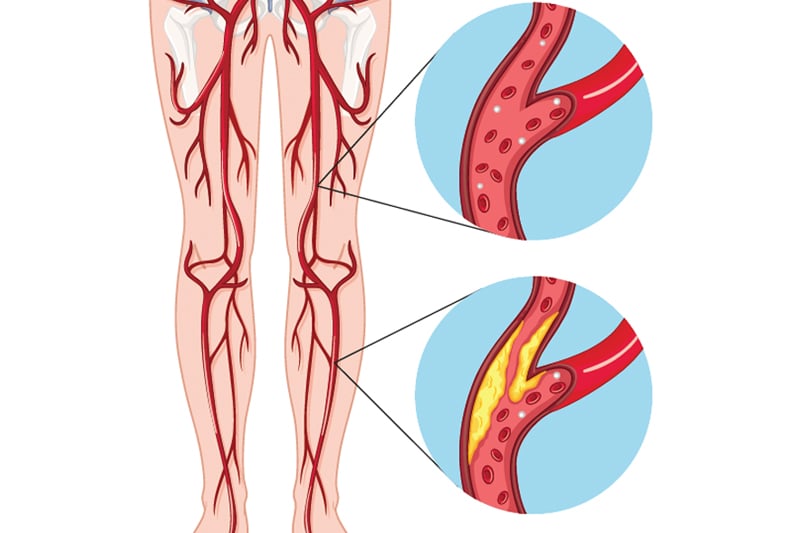Peripheral Arterial Disease (PAD), sometimes referred to as “hardening of the arteries,” is a common circulatory problem in which arteries narrowed by the buildup of arterial plaque reduce blood flow to your extremities. It is most often caused by the buildup of arterial plaque, a condition called atherosclerosis that is directly related to high cholesterol levels. PAD can develop in the arms, but it is primarily found in the legs. PAD affects men and women equally, although African-Americans and Hispanics have a higher degree of risk than Caucasians. Approximately 8 million people in the US have PAD, including 12-20% of all people over the age of 60.
Common symptoms of PAD include numbness or weakness in the legs, pain or cramping in the legs after walking or climbing stairs, coldness in the legs, feet, or toes, sores or color changes on the legs, hair loss or shiny skin developing on your legs and feet, weaker leg pulse, and erectile dysfunction in men. However, it is possible to have PAD and display none of these symptoms, especially if you at high risk for the condition.

Risk factors for PAD include smoking (which increases your risk 2-4 times), obesity, high blood pressure (over 140/90), diabetes, aging, and a family history of heart disease or stroke. PAD is a serious disease, because left untreated it can cause critical limb ischemia (open sores that don’t heal, sometimes developing into gangrene and requiring amputation), stroke, and heart attack.
PAD can be diagnosed during a physical examination if weak or absent pulses are found in your extremities, and also by using the ankle-brachial index, a test in which blood pressure in your arm is compared to blood pressure in your ankle. Your Hudson County cardiologist may also use other non-invasive procedures such as Doppler ultrasound (which can visualize actual blood flow through the arteries to pinpoint blockages or narrowed arteries), specialized blood tests, and angiography.
Treatment of PAD has two primary goals – to manage symptoms, and to stop the progression of atherosclerosis to reduce the risk of heart attack and stroke. In some cases this can be accomplished by lifestyle changes such as smoking cessation, weight loss, and regular exercise. In other cases, medications can be used to lower cholesterol and high blood pressure levels, to control blood sugar, prevent the formation of blood clots, and relieve extreme symptoms.
.png)
Monday - Friday
8 am - 5 pm
Saturday
Upon Request
Sunday
Closed
Early evening weekday hours are available upon request.
.png)
Schedule an Appointment Now
Saturday and early evening weekday hours are available upon request.

Hoboken (201) 350-2711
Secaucus (201) 479-3219
Edgewater (201) 499-7361
North Bergen (201) 654-6655
Teaneck (201) 343-4510
Secaucus Office
38 Meadowlands Parkway
Secaucus, NJ 07094
(201) 479-3219
Edgewater Office
103 River Road 2nd floor
Edgewater, NJ 07020
(201) 499-7361
North Bergen Office
7322 Bergenline Avenue
North Bergen, NJ 07047
(201) 654-6655
Teaneck Office
222 Cedar Lane Suite 204
Teaneck, NJ 07666
Phone: 201 343 4510
Rick Pumill, MD Secaucus NJ
Fernando Segovia, MD North Bergen NJ
Yaron Bareket, MD Secaucus NJ
Christopher Pumill, MD Hoboken NJ